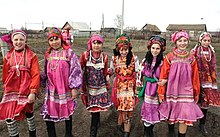Mordwinen

The Mordvins (also Mordva ) are a people of 1,072,900 people ( 1989 census ) of the Finno-Ugric language group in Russia , mainly in the autonomous republic of Mordovia (Mordovia).
They belong to the Volga Finns and fall into the two main groups of Ersja (Эрзят, Ersjat) and Mokscha (Мокшот, Mokschot) . They refer to themselves exclusively as Ersja or Mokscha - the association to a Mordovian people is not accepted by them and they have no equivalent for “Mordvins” in their languages. The term Mordva, which is sometimes used, is taken from Slavic and has no meaning in Mordovian itself. Instead, the term mokschersjan is used to denote conditions that apply to both groups . Other groups of the Mordwinen are the Schokscha , which, however, only consist of a few thousand people, as well as Terjuchen and Karataier . The latter two have been completely absorbed by Russians and Tatars for a long time .
population
Only about a third of the Mordvins live within the Republic of Mordovia. As titular nation , they only make up 32.5 percent of the population there. The rest is split between Samara (Census 1989: 116,475), Penza (86,370), Orenburg (68,879), Simbirsk (61,061), Nizhny Novgorod (36709), Saratov (23,381), Republic of Bashkortostan (31,932), Republic of Tatarstan (28859) and Republic of Chuvashia (18,686).
language
The two groups of Ersja and Mokscha speak the main dialects Ersjanisch and Mokschanisch , which together form the Mordovian languages and sometimes have significant differences from one another. At the last census, 67 percent of Mordvins said they used Mordovian as their first language. Many Mordvins are bilingual or even trilingual with Russian or Tatar .
History and politics
In the year 551 AD they are mentioned for the first time by the Gothic historian Jordanes as murders among the peoples subjected to Ermanaric .
The separation of Ersja and Mokscha, which came relatively early under the influence of the Russians, probably began in the 8th century. With the founding of Nizhny Novgorod in 1221, the Russians began increasingly to penetrate the core area of Mordovian settlement. As a result of the clashes between the Russians and Volga Bulgarians or with the Golden Horde , the Mordvins shifted their settlement areas further and further south and east and thus splintered over great distances to the east of the Urals .
The Russification of the Mordvins, which was already strong due to the early influence of the Russians , has been further intensified since the 1930s, although in 1928 they were given an autonomous territory within the Soviet Union . When the minorities of Russia first became an issue with the collapse of the Soviet Union , a slightly euphoric new national consciousness began among Ersja and Mokscha. In fact, however, the Mordvinen today are rather indifferent to the subject. Although Ersyan and Mokshan are the constitutional languages of the Republic of Mordovia alongside Russian , they are hardly used in everyday life.
religion
Christian proselytizing lasted from the 16th century to the 18th century, and today Mordvins are predominantly Russian Orthodox Christians. There are also some followers of the animistic - traditional religion , as the Mordvins have a rich ancient mythology .
literature
- Uno Holmberg-Harva : The religious ideas of the Mordwinen. FF communications No. 142, Suomalainen Tiedeakatemia, Helsinki 1952
Web links
- Mordovian mythology (PDF file; 58 kB)
- Toorama - Mordovian traditional music ( Memento of May 14, 2010 in the Internet Archive )
- The Mordvinen report of the radio station "Voice of Russia"

